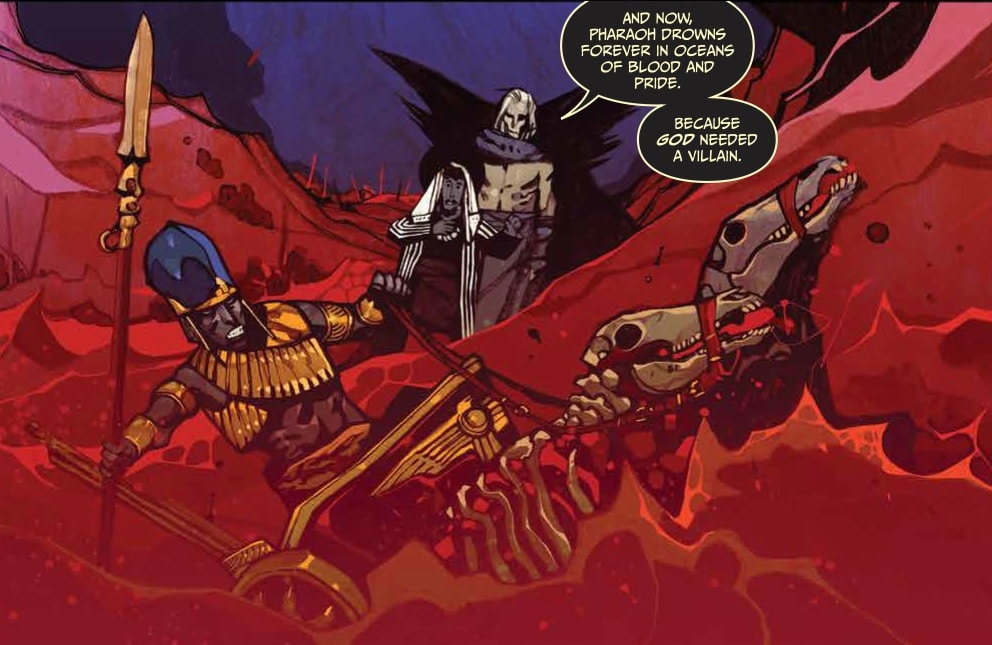When we last left Judas Iscariot, he was burning in the pits of Hell for turning his back on Jesus. I’m sure you know the official story: Judas, one of the thirteen apostles of Jesus Christ, betrayed our Lord and Savior to the Romans and had him crucified for the sins of humankind. The comic Judas, though, seems to tell a different tale. In Judas #1, our anti-hero questions his purpose in the Jesus’s grand scheme; and if Jesus was all-knowing, then surely he must have known that Judas wasn’t exactly sold on the whole Christianity thing. So why did he allow him into his clique in the first place? What is his deal anyway? These questions and more underline the hottest theological comic on the stands since Preacher, and issue two keeps on keeping on with the why-and-what if’s of everyone’s favorite Savior! Combined with stunning art by Jakub Rebelka, this hard-hitting comic will have you at the edge of your philosophical seat.
In the second issue, we are finally introduced to Judas’s new friend in Hell, Lucifer Morningstar. On first reaction, Judas immediately blames the fallen angel for his mistrust in Jesus, but Lucifer assures him that, despite any claims, his lot in life is to not tempt men. He claims that he and Judas have suffered the same; that they were made into villains by a vain and petty God who needed adversaries to firm his hold on the world. Though still dubious, Judas can’t help but see the connection between himself and other ‘villains’ in the Bible, how they were used, tricked, and tossed aside. Lucifer continues to tell him of his time in Heaven and how he, just like Judas, simply wanted more from God and got banished for it. Is Lucifer really telling the truth as he claims, or is the surprise witness he brings to hammer his point home a simple illusion from the Prince of Lies?
 This issue, like most second issues, is a lot more filler than action, so unfortunately there are no giant angel monsters or the crawling dead of Hell. That being said, writer Jeff Loveness handles the filler really well, and almost takes a note from the Hellboy playbook by doing a show-and-tell type of work. As Lucifer and Judas speak, the comic will cut back to different places in the Bible and illustrate the points Lucifer is making. It’s a breezy way to help gain sympathy for Judas and Lucifer, especially when Lucifer starts scrolling off the names of other villains, allowing Judas to realize that he’s not alone as he thought. That brings up another armchair theology point: if Judas is simply a pawn in God’s plan, what about Jezebel, Goliath, Lot’s Wife, or even the Pharaoh, who wasn’t actually that bad until God ‘hardened his heart’ to Moses? Why would God purposely ask for sacrifices from his followers and harden his enemies? This leads to the very first question that Judas had: if God is all powerful, why does he let bad things happen? Lucifer suggests that it’s all part of God’s plan, something echoed by many Christians today, but little do they know how dark God’s plan is. It’s interesting to watch Judas come to terms with his own abandonment and try to figure out if Lucifer is telling the truth at all.
This issue, like most second issues, is a lot more filler than action, so unfortunately there are no giant angel monsters or the crawling dead of Hell. That being said, writer Jeff Loveness handles the filler really well, and almost takes a note from the Hellboy playbook by doing a show-and-tell type of work. As Lucifer and Judas speak, the comic will cut back to different places in the Bible and illustrate the points Lucifer is making. It’s a breezy way to help gain sympathy for Judas and Lucifer, especially when Lucifer starts scrolling off the names of other villains, allowing Judas to realize that he’s not alone as he thought. That brings up another armchair theology point: if Judas is simply a pawn in God’s plan, what about Jezebel, Goliath, Lot’s Wife, or even the Pharaoh, who wasn’t actually that bad until God ‘hardened his heart’ to Moses? Why would God purposely ask for sacrifices from his followers and harden his enemies? This leads to the very first question that Judas had: if God is all powerful, why does he let bad things happen? Lucifer suggests that it’s all part of God’s plan, something echoed by many Christians today, but little do they know how dark God’s plan is. It’s interesting to watch Judas come to terms with his own abandonment and try to figure out if Lucifer is telling the truth at all.
Much like the first issue, perhaps the greatest strength is that despite the disapproving take on God’s choices, the comic never mocks Christianity. It still handles the religion with respect while asking questions about the biggest players in the Bible. It almost reminds me of a person struggling with their faith; not just Judas, but anyone who has ever been deeply involved in a religion. You still believe the basic ins and outs of the ideology, but when you dig deep, the details seem to fall apart. The comic forces the reader to wonder if they can still have faith when their Creators aren’t all they appear to be. How close can you look at your God and still believe in him? Maybe Lucifer really did get into Judas’s head and has been lying all this time. Much like the good book itself, it’s open to interpretation.
Once again, Loveness does a smart and quick read about a subject that’s really pretty heavy, and knows when to cut back before getting too heavy handed. As mentioned, he lets the reader come to their own conclusion and doesn’t aim to change anyone’s faith, merely to explore it. This definitely feels like it’s coming from someone with experience in the field of Christianity, allowing the work to come off very authentic. Rebelka continues to do both the art and the coloring on the comic, and maintains his beautiful color transitions between life and death. The figures are mostly stand-still but he manages to avoid boring illustrations through dynamic art spreads and solid pops of colors. Put together, these guys really helped Judas earn its $4 price tag!
Go pick up Judas #2 on stands now!
